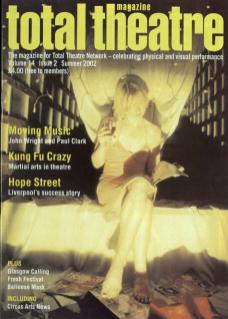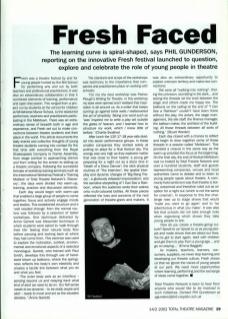Fresh was a theatre festival by and for young people hosted by the Brit School for performing arts and run by both teachers and professional practitioners. It was also an extraordinary collaboration in that it combined elements of training, performance and open discussion. This ranged from a project run by students at the school for children at Whitehorse Manor School, to the seasoned performers, teachers and practitioners participating in the Meltdown. There was an extraordinary sense of breadth both in age and experience, and Fresh set out to make connections between theatre students and their place in the world. This article documents the daily events and collective thoughts of young theatre students coming into contact for the first time with everything from the Royal Shakespeare Company to Frantic Assembly, from stage combat to approaching silence, and from writing for the screen to setting up a theatre company. Following the successful formats of workshop training seminars such as the International Workshop Festival's 'Training Matters' or Total Theatre Network's 'Discovery', the days were divided into warm-up, training, practice and discussion elements.
Each day would begin with warm-ups that enabled a large group of people to come together, focus and actively engage minds and bodies. This established structure and a 'well needed change from the normal routine’ was followed by a selection of taster workshops. One technique delivered by Annie Garrett was Alexander technique in which students were asked to 'walk through their life' feeling their natural body flow before pausing and looking back at where they had come from. This exercise was used to explore the motivation, subtext, environmental and emotional aspects of a selected monologue. Garrett, who trained with Paul Smith, develops this through use of hand-sized blown up balloons, where the springiness reflects the body's own elasticity and creates a tactile link between what you do and what you feel:
'The outer body acts as an interface – sensing beyond us and relaying back what kind of alert we need to be on. Our felt sense needs to be dynamic – to be really aware and alert – ready to move and act as the situation dictates.' (Annie Garrett)
The standard and scope of the workshops was testimony to the importance that companies and practitioners place on working with schools:
‘For me the best workshop was Paines Plough's Writing for Theatre. In this workshop my eyes were opened and I realised that inspiration is all around us. As a writer that keeps coming up against brick walls / rediscovered the art of simplicity. Taking one word such as “was” inspired me to write a play set outside the gates of heaven, and I learned how to structure my work, which I knew little of before.' (Charlie Swallow)
After lunch the 120 17-18 year-olds divided into seven performance groups. In these smaller companies they worked solely at putting on plays for a final festival day. The energy was very high as they explored matter that was close to their hearts: a young girl preparing for a night out as a disco diva in Death of a Disco Dancer, the slick physical routines of The Interview; the spatial interplay and dynamic changes of Big Bang Theory, a gloriously released improvisation; and the sensitive storytelling of I Can See a Rainbow, where the audience wrote their wishes onto multi-coloured bottles. All these pieces reflected the lives and concerns of the next generation of theatre-goers and makers. It was also an extraordinary opportunity to explore unknown territory and make new connections:
'We were all "walking into nothing", finding the unknown, stumbling in the dark... and seeing the threads (at the end) between the stage and others made me happy too. The balloons on the ceiling at the end of I Can See a Rainbow couldn't have been there without the play, the actors, the stage management, the site staff, the finance manager, the balloon maker, the architect of the building. All those threads between all sorts of nothing.' (Stuart Worden)
Each day closed with a chance to reflect and begin to draw together some of these threads in a session called 'Meltdown'. This provided a closure in the same way as the warm-up provided the focus at the beginning. On the final day, the end-of-festival Meltdown was co-hosted by Total Theatre Network, and over a hundred students, staff and guests representing companies, venues and local authorities came to debate and to listen to young people speak about theatre. A commonly held sentiment was that theatre is boring, overpriced and therefore ruled out as an option for a night out (which is not the same for cinema!). In response to this the challenge rose up to stage shows that would 'make you want to go again’ and to 'be adventurous in what you make'. It was also felt that schools did not take enough risks when organising which shows they take young people to see.
‘How do you create a theatre-going culture? Speak to us! Speak to us as young people and make shows that are about our lives. You've got to start again, start with children and get them to play from a young age... and go on playing...' (Emma Baggott)
As makers, teachers, learners, consumers, suppliers, we never stop learning and developing our theatre culture. Fresh shows us that we ignore the voices of young people at our peril. We need more opportunities where learning, performing and the exchange of ideas come together.
Total Theatre Network is keen to hear from anyone who would like to be involved in such initiatives. Contact Phil Gunderson at pgunders@brit.croydon.sch.uk

